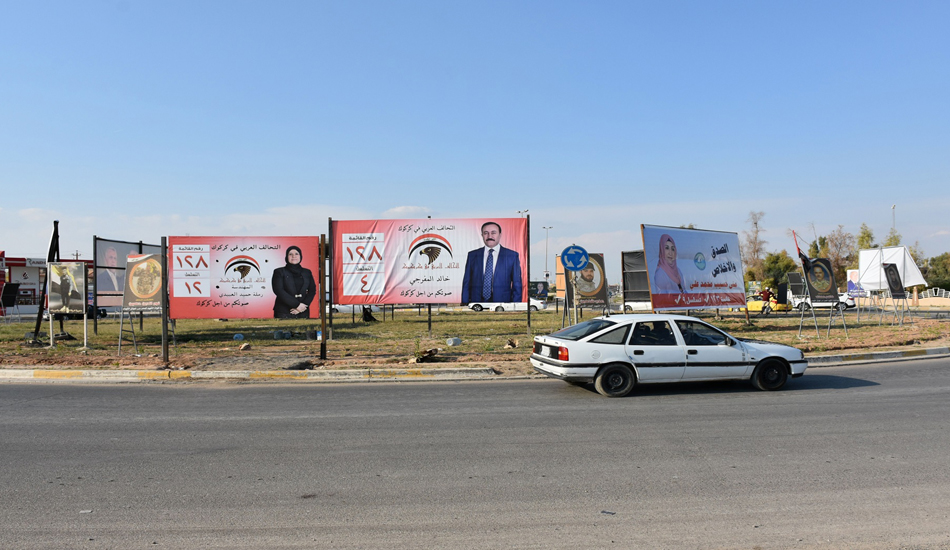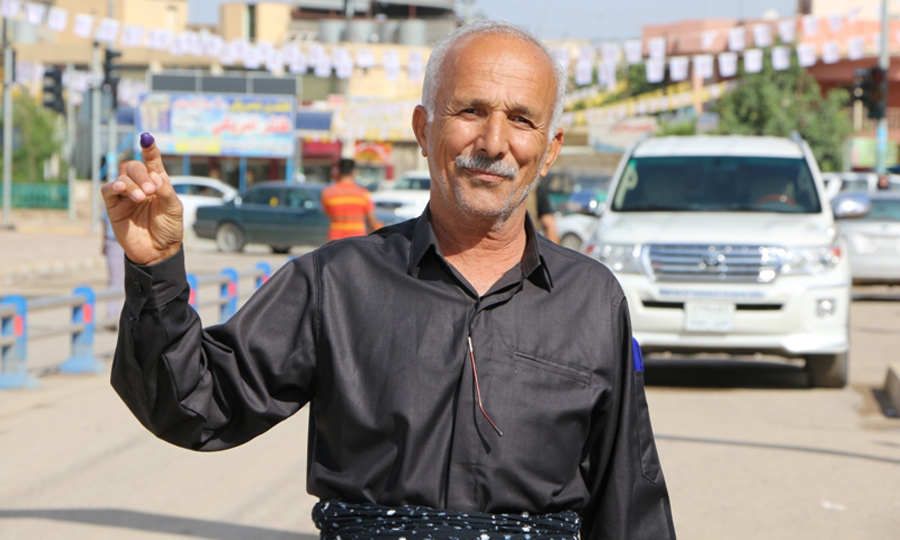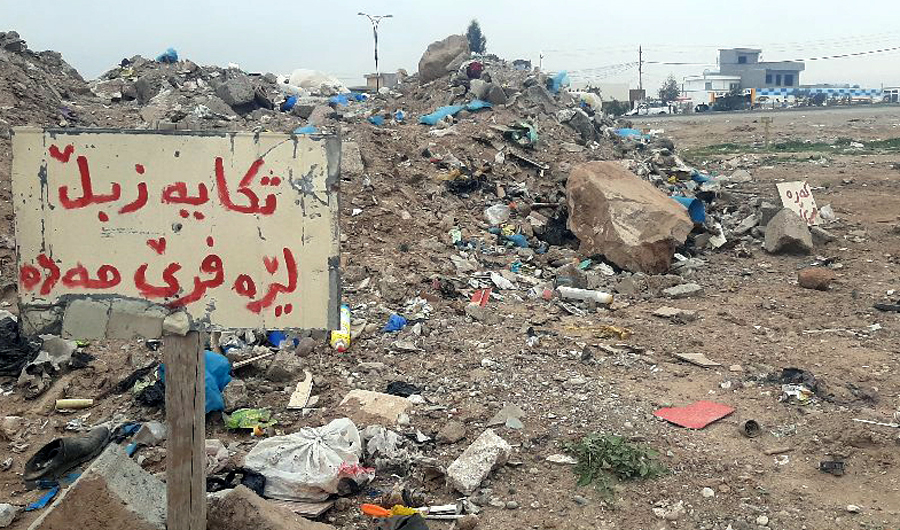The Kurdish political parties are likely to win the five seats of the first electoral of Kirkuk yet they work hard to compete their 100-years Turkmen and Arab neighbors in the second electoral district, a symbol for the multi-ethnic disputed city.
In the first electoral district, about 450,000 voters, mainly Kurds, nine parliamentary candidates by the Kurdish political parties and alliances along with 10 independent nominees compete to win the five seats.
Arab and Turkmen political parties have registered their candidates for the Kurd-dominant district yet their chances are like chances of the Kurds in the third Arab-dominant electoral district.
The second electoral district of Kirkuk is the complicated and unpredictable part of Kirkuk. Kurds work hard to earn one or two out of the four seats. Five Kurdish candidate by the political parties and several independent candidates compete their Arab and Turkmen rival in this district.
The district of Daquq, south of Kirkuk, home to the Kaka’i community, and part of Kirkuk southern parts make the second electoral district of Kirkuk, where the multi-ethnic neighbors of Kirkuk are located.
The third Arab-dominant electoral district has only three seats for which one Kurdish political party has registered one candidate. The district coveres the town of Hawija, Rashad, Multaqa, Zab, al-Abbasi and al-Riyadh.
Over one million eligible voters of Kirkuk will nominate 12 members of the parliament MPs to Baghdad out of 130 nominees in October 10th elections.
Kirkuk, 238 km north of Baghdad & Iraq's second largest oil reserves, is ethnically a mixed province for 1.6 million Kurds, Arabs, and Turkmens. It has long been at the center of the disputed territories between Baghdad and the autonomous Kurdistan Regional Government KRG.

Kirkuk, September 2021- The candidates are leading intestine electoral campaign all over Kirkuk. KirkukNow
The competition for seats among the Kurdish political parties makes it hard to predict which party is going to get the how many seats in each district.
The Patriotic Union of Kurdistan PUK led by co-presidents Bafel Talabani and Lahoor Sheikh Jangi is the leading Kurdish party in Kirkuk since 2005. PUK has got 6 out of 12 seats of Kirkuk in Iraqi parliament elections of 2013 and 2018 while Arabs and Turkmens each got three seats.
The Kurdistan Democratic Party KDP won only two seats of 12 seats of Kirkuk parliamentary seats in 2013 and boycotted 2018 elections in Kirkuk.
“The new system of elections is not in favor of the Kurds. Our votes are scattered over three electoral districts making it hard for us to guarantee our votes in some district,” said Shakhawan Abdullah, candidate of KDP for Kirkuk’s first electoral district.
“It depends how each party sets its plan for its candidates and voters,” Abdullah added.
The KDP has nominated a female candidate for the heat race in the second electoral district as the new law imposes one quota seat in each electoral district for the female candidate which gets the highest votes among all women candidates.
“We have set our plan carefully and work to win two seats, one in first district and another in the second district.”
The new system of elections is not in favor of the Kurds
The Kurds who got 8 out of the 12 seats of Kirkuk in the Iraqi parliament in 2013 has dropped their seats into six in 2018 elections.
The PUK and KDP were the key role players in Kirkuk following the toppling of Saddam Hussein regime in April 2003 up to 2014 when they marched forward following retreat of Iraqi forces from some regions due to the war against the Islamic State ISIS.
In October 2017, the Iraqi government declared victory over IS and launched (Law imposing) military process and took over power in the territories disputed between Baghdad and Erbil.
The new electoral law ratified last November, a key demand of demonstrators in 2019, changed each of the country’s 18 provinces into total 83 electoral districts in order to prevent parties from running on unified lists, which has in the past helped them easily take all the seats in a specific province. Instead, the seats would go to whoever gets the most votes in the electoral districts.
The 329-member house of representatives was elected in May 2018. The vote is held every four years, but 2019 protesters have been demanding early elections.
Out of 40 million population, 25 million eligible voters run to the ballots on October 10th to elect only 329 members into Iraqi parliament out of 3,234 nominees.

Khanaqin 2018- A Kurdish voter in Kurdish traditional costume raises his index finger in purple color, showing he has fulfilled his duty. KirkukNow
The Kurdistan alliance made up by the PUK and Gorran (Change movement) are planning to take all the five seats of the first electoral district and earn 1-2 seats of the second district yet the internal disputes of PUK and the rivalry of KDP might put them in a position not better than 2018 or even worse.
The Alliance had five candidates in the first district yet lately the PUK has excluded Alla Talabani, currently member of the Iraqi parliament, due to her close ties with Lahur Sheikh Jangi, the co-president of PUK deprived of his privileges and banned from leading electoral campaign.
Instead, the PUK asked its supporters to vote for Delan Gafour, member of the Iraqi parliament, which has been registered as an independent nominee, consequently Kurdistan alliance has six candidates for five seats in the mainly Kurdish district.
“This crack of PUK and Gorran voters is in the interest of KDP and New Generation candidates because each of them has only one candidate thus all the seats might not be won by the alliance,” a PUK election official in Kirkuk said anonymously.
According to the new electoral system, the candidates who get the higher votes will earn parliamentary seats.
“The internal disputes of PUK have put us in a situation that we have six candidates for five seats. In the worst scenario, we might loose two seats and the best scenario is we earn the five seats all,” he added.
The internal disputes of PUK have put us in a situation that we have six candidates for five seats
56 candidates, five of them Kurds, compete for the four seats of the second electoral district of Kirkuk.
The voters of Kirkuk are frustrated with the empty words of the candidates who pup up each four years.
“I am going to vote in order to leave no space for fraud and I don’t think will get the same votes since everybody says voting is useless and changes nothing,” said Mahmoud Hawta, a young resident of Rahimawa mainly Kurd inhabited neighborhood.
He thinks Kurds will lose some seats compared to 2018 elections.
The province misses proper utilities of power supply, drinking water, garbage collection, and basic health care and education system badly hurt by corruption and long years of war and instability.
Garbage collection was one of the basic public services missing in the province. Kirkuk municipality said last April about 1200 tons were collected on daily bases now came down to only 200 tons. Last February two campaigns were funded to clean 70,000 tons.

Kirkuk, March 2021- A sign says do not throw garbage here in a site where garbage has been piled due to absence of regular garbage collection. KirkukNow
Four members of the Iraqi parliament MPs, Arabs and Turkmens from Kirkuk, called for delay of the upcoming October parliamentary elections in Kirkuk for a week due to the dangerous situation in Kirkuk in a press conference in mid-September, a matter rejected by the Kurds and the Independent High Electoral Commission IHEC.
Ali Mohammed, a resident of Shorija neighborhood, said he has decided since 2005 to boycott the elections.
“Every time the Kurdish parties claim they will serve the voters and the city but nothing seen on the ground,” Mohammed said. “What was the benefit of voting in terms of public service, security and our ethnic rights?”
Over 87% of Kirkuk voters have claimed their biometric voting cards yet the public is frustrated and vows to boycott the process.
“Voting is a legal right and boycott is not a solution because voting puts pressure on the leading powers who forgot about the public and have to review their agendas,” said Chinar Chalak, a 20-year-old student.
The multi ethnicities of Kirkuk has failed to form a multi ethnic list for Iraqi parliament elections thus the prediction of seats for each ethnicity is unpredictable.
Mohammed Nasradin, a candidate of Kurdistan Alliance, said “the idea of the coalition was for the sake of unity of Kurdish parties in Kirkuk. We want to preserve the Kurdish position and power.
Nasradin is confident that Kurds will earn the five seats of the first electoral district and the tow seats of the second.
“More seats, means more guarantees for Kurdish existence and position in the city.”




